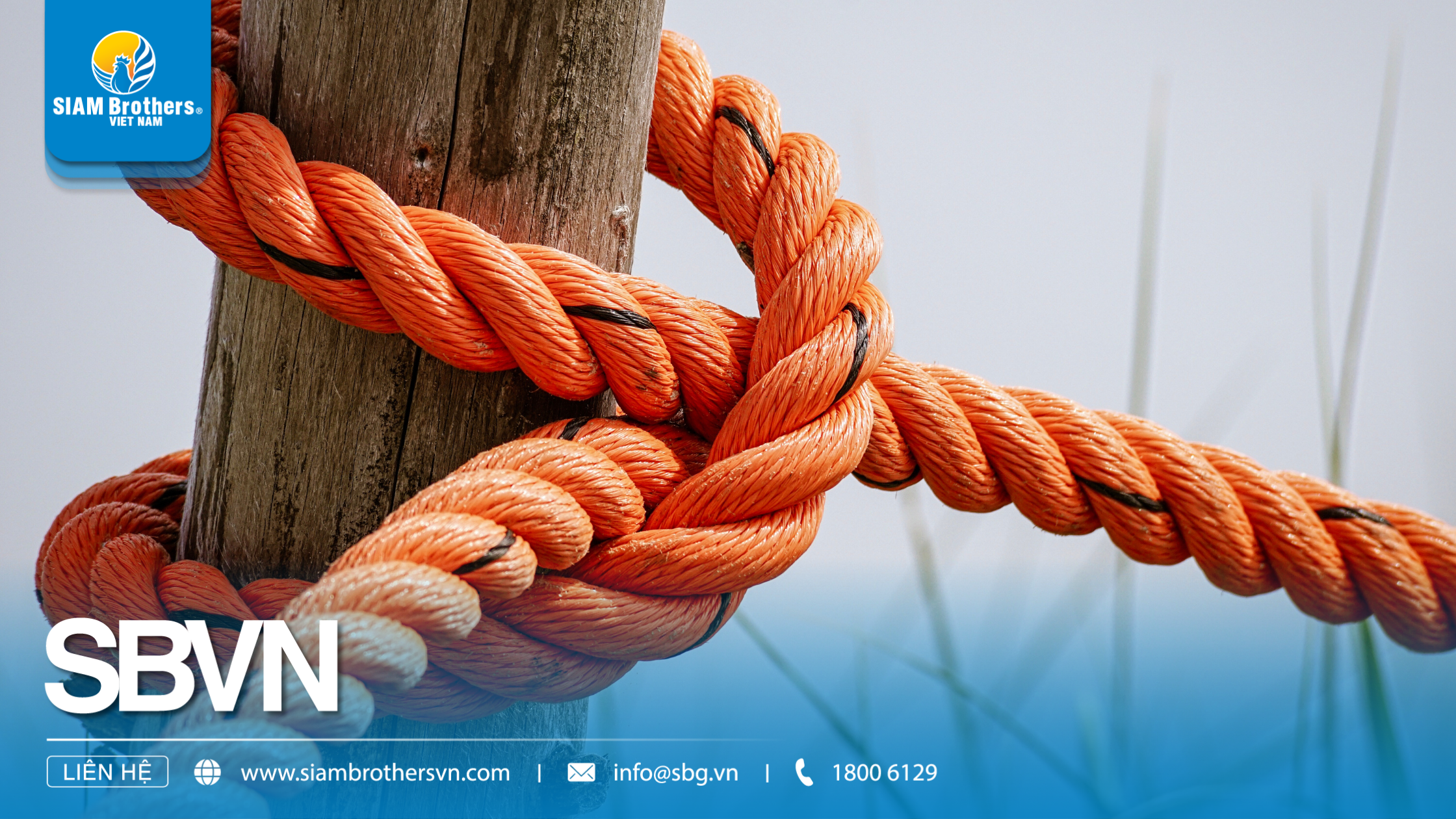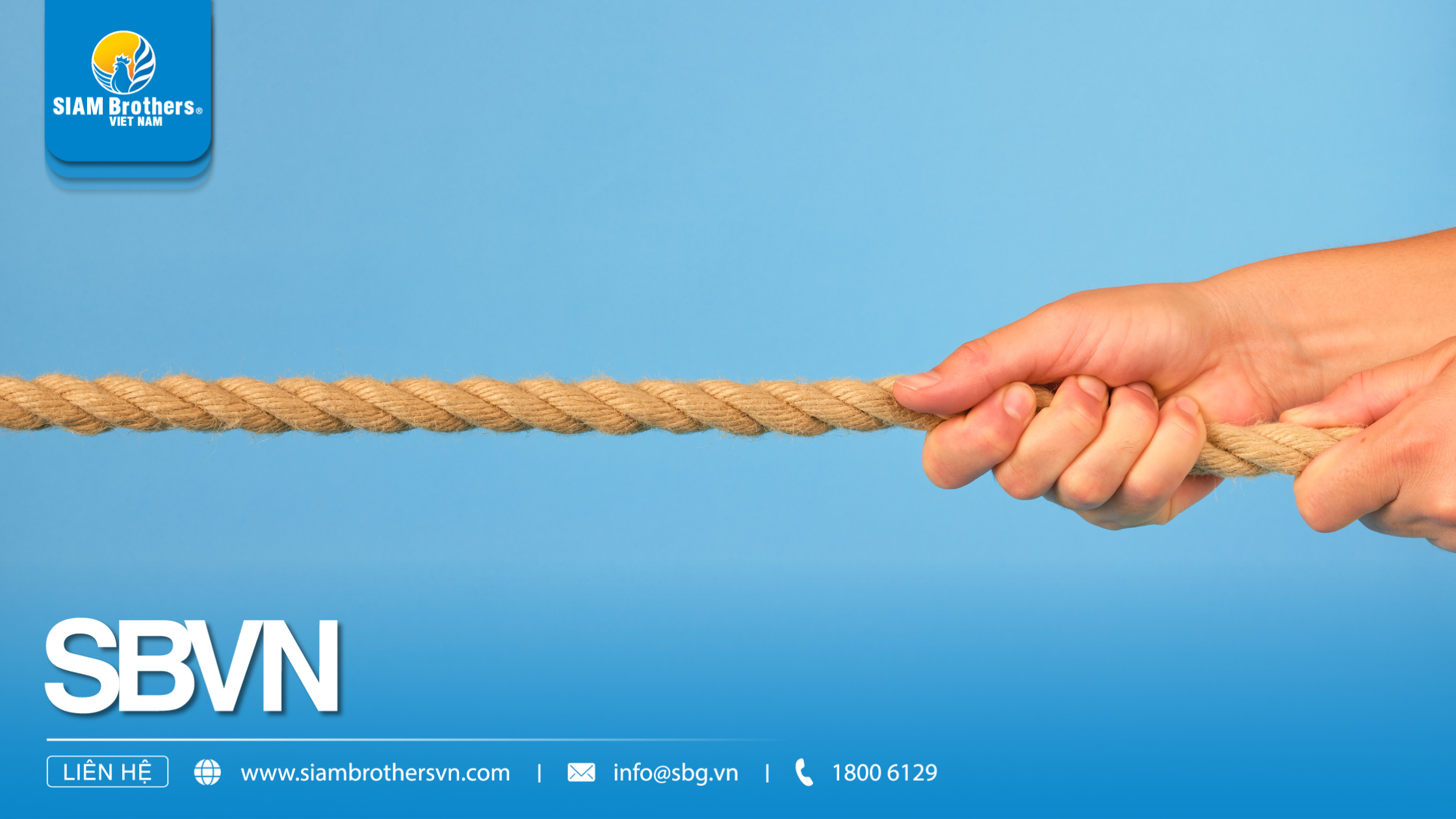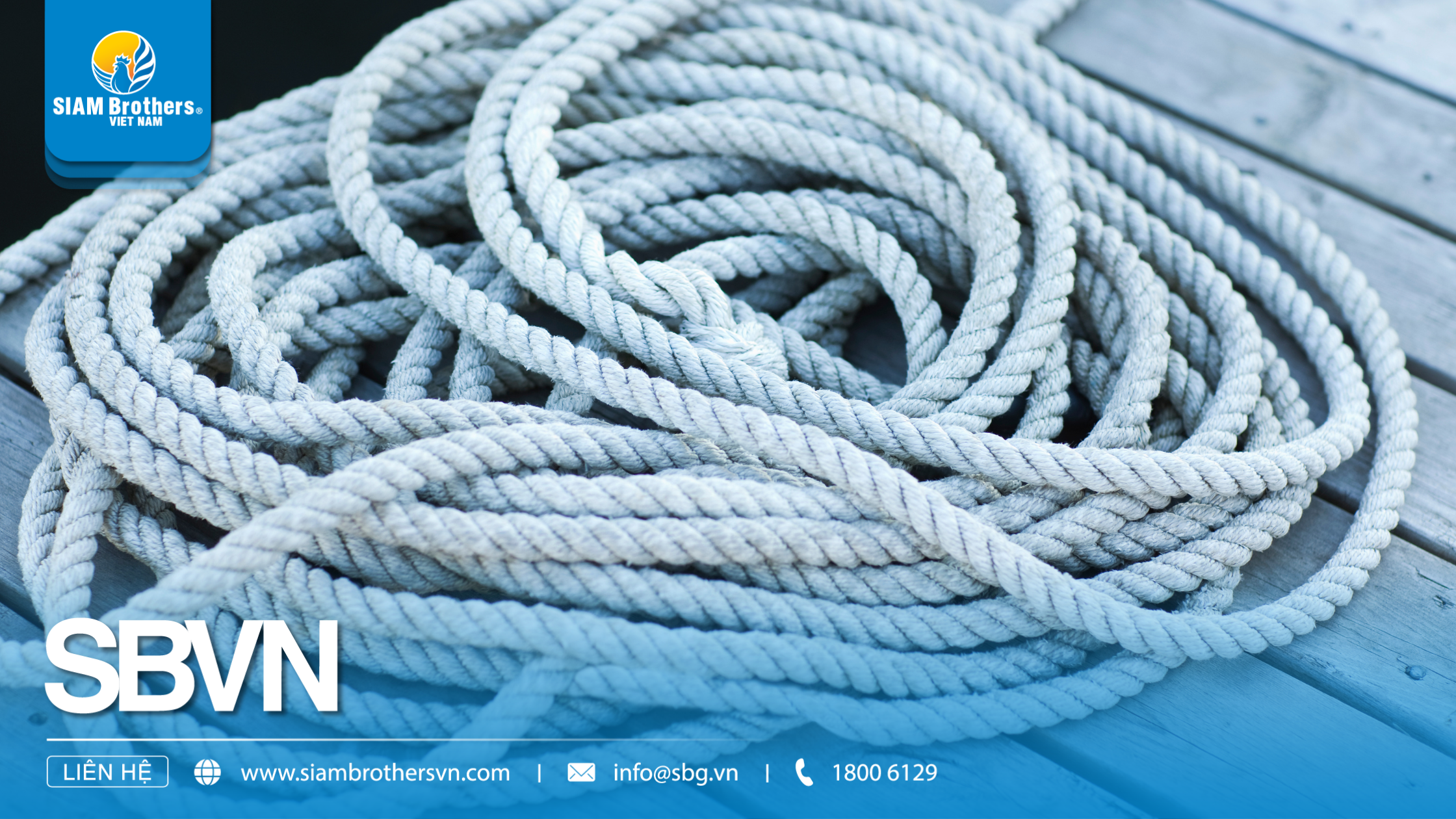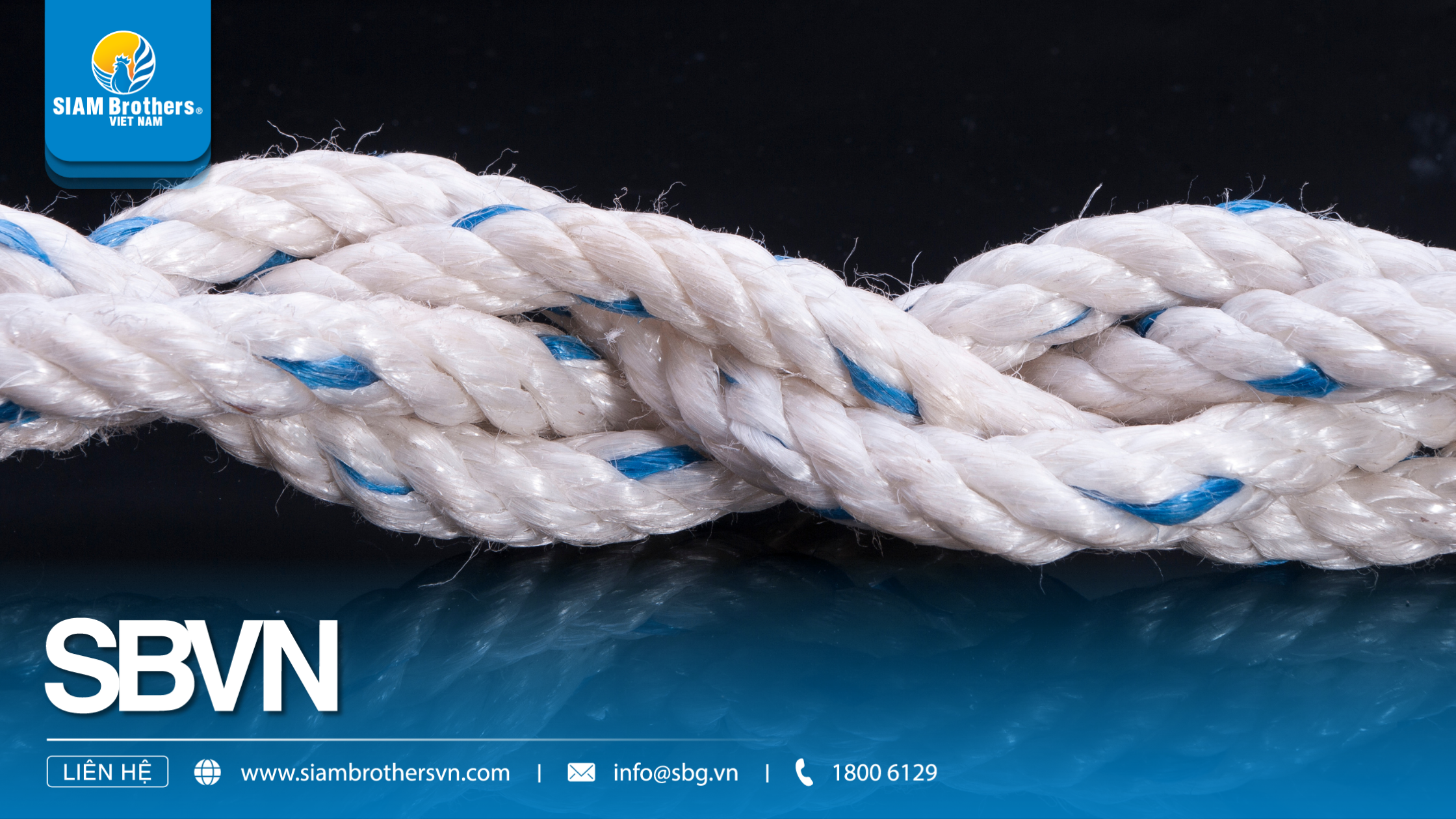Virgin rope and recycled rope often cause hesitation when choosing the right option for agriculture and fisheries. Each type has its own advantages and disadvantages, directly affecting durability, costs, and overall efficiency. In this article, SIAM Brothers Vietnam will help you understand the key differences between the two, from material quality, tensile strength to practical applications, so you can confidently select the most suitable solution for your farming or fishing model.
1. What is Virgin Rope?
Virgin rope is made from virgin plastic resin – pure, unused material that has never been recycled. This ensures a high level of purity, free from contaminants, delivering consistency in both color and quality.

1.1. Key Features of Virgin Rope
- Bright, glossy color: Easy to recognize even after long-term outdoor use.
- High mechanical strength: Excellent resistance to tension, abrasion, and harsh environments such as seawater or strong sunlight.
- Lightweight yet strong: Easy to handle, saving time and labor.
- Safer for agriculture and fisheries: Reduces microplastic release, minimizing risks of water pollution.
1.2. Common Applications in Agriculture and Fisheries
- Aquaculture: Used in HDPE cage buoy ropes, debris boom ropes, and fishing gear support.
- Agriculture: Tying crops, securing trellis systems, or bundling produce for transportation.
- Industrial & maritime projects: Anchoring vessels, securing offshore equipment.
1.3. Why is Virgin Rope Preferred?
- Superior durability and longer lifespan compared to recycled rope.
- Reduces the need for frequent replacement, cutting long-term costs.
- Offers peace of mind for long-term agricultural and fishery operations.
2. What is Recycled Rope?
Recycled rope is manufactured from recycled plastic – post-consumer materials collected, processed, and converted into resin pellets. During recycling, plastic often becomes mixed with impurities or additives, making its quality less consistent than virgin rope.

2.1. Features of Recycled Rope
- Lower cost: A budget-friendly choice for short-term projects.
- Darker, duller colors: Lacks the brightness and aesthetic appeal of virgin rope.
- Reduced durability: Weaker resistance to tension and abrasion; more prone to damage under prolonged sun or saltwater exposure.
- Limited safety: Higher risk of microplastic shedding, impacting the environment and produce.
2.2. Common Applications of Recycled Rope
- Temporary packaging: Securing goods for short-distance transportation.
- Product bundling: Used in warehouses, logistics, and packaging.
- Low-impact environments: Indoor or shaded uses with minimal exposure to water or sunlight.
2.3. When to Choose Recycled Rope Instead of Virgin Rope?
- For short-term agriculture or fishery projects without long-term investment needs.
- When budgets are limited but basic rope functions are still required.
- In situations where high durability and aesthetics are not a priority.
3. Comparison Between Virgin Rope and Recycled Rope
3.1. Overview Comparison Table
| Criteria |
Virgin Rope |
Recycled Rope |
| Raw Materials |
100% pure virgin resin, never used or recycled |
Recycled plastic with additives and impurities |
| Durability & Strength |
High, stable long-term performance |
Lower, easily damaged under heavy loads |
| UV & Corrosion Resistance |
Excellent, suitable for marine and outdoor environments |
Limited, degrades quickly under harsh conditions |
| Color & Aesthetic |
Bright, glossy, uniform |
Dark, less visually appealing |
| Cost |
Higher |
Lower |
| Typical Applications |
Aquaculture, agriculture, outdoor projects |
Temporary bundling, warehouse use |

3.2. Pros and Cons of Virgin Rope and Recycled Rope
3.2.1. Virgin Rope
Advantages:
- Superior durability, excellent tensile strength, and abrasion resistance.
- Outstanding resistance to UV rays, seawater, and chemicals.
- Safer for applications involving food contact or aquaculture environments.
Disadvantage: Higher price, requiring greater initial investment.
3.2.2. Recycled Rope
Advantages:
- More affordable, suitable for short-term projects.
- Promotes recycling by reusing plastic waste, reducing environmental impact.
Disadvantages:
- Rapid degradation, prone to cracking or breaking under harsh weather.
- Inconsistent quality due to mixed raw materials, difficult to control.
3.3. Suggested Choices
- If you require long-term durability and resistance to extreme conditions such as marine fish farming, pepper cultivation, or vessel mooring – Virgin Rope is the ideal option.
- If your needs are short-term and do not demand high durability – Recycled Rope will be a more cost-effective solution.
4. Criteria for Choosing Between Virgin Rope and Recycled Rope in Agriculture and Fisheries
4.1. Durability and Tensile Strength
- Prioritize ropes with high tensile strength and excellent abrasion resistance.
- Virgin rope is superior thanks to its uniform fiber structure, minimizing stretching or breaking under heavy loads.
4.2. Resistance to Environmental Impact
- For aquaculture or outdoor farming, ropes must resist UV rays, seawater, and mold.
- Virgin rope offers better weather and chemical resistance, ensuring longer service life.
4.3. Safety and Hygiene
- When ropes come into direct contact with aquaculture water or agricultural products, they must be free from harmful impurities.
- Virgin rope ensures greater safety because it is made from 100% pure virgin resin.
4.4. Investment Cost and Lifespan
- Balance between upfront costs and replacement frequency.
- Recycled rope is cheaper but degrades quickly, while virgin rope can reduce long-term expenses thanks to its extended lifespan.
4.5. Specific Applications
- Marine fish farming, vessel mooring, and industrial crop cultivation → choose Virgin Rope for durability.
- Temporary bundling or light-duty use → recycled rope can meet basic needs.

5. Frequently Asked Questions About Virgin Rope
Yes. Since it is made from pure virgin resin, virgin rope contains no harmful chemicals, making it suitable for aquaculture and agricultural production.
5.2. How long does Virgin Rope last?
Depending on usage conditions, virgin rope can last 3–5 years or more, thanks to its resistance to UV rays, abrasion, and environmental impact.
5.3. Where should I buy Virgin Rope to ensure quality?
Choose reputable manufacturers such as SIAM Brothers Vietnam – a trusted producer and distributor of high-quality ropes that meet international standards for both agriculture and fisheries.
Pro tip: Before purchasing, clearly define your usage purpose and technical requirements to select the most suitable virgin rope, maximizing both efficiency and cost savings.

With outstanding durability, abrasion resistance, and safety, Virgin Rope remains the optimal choice for agriculture and fisheries compared to recycled rope. Choosing the right type of rope not only improves productivity but also reduces long-term costs. Contact SIAM Brothers Vietnam today to get expert advice and premium virgin rope tailored to your needs.
Source: SIAM Brothers Vietnam
Contact us:
Address: 5th floor, VRG Building, 177 Hai Ba Trung Street., Vo Thi Sau Ward, District. 12, Ho Chi Minh City, Vietnam
Tel: (+84) 28 38 912 889
Hotline: 1800 6129
Facebook: www.facebook.com/siambrothersvn
Email: info@sbg.vn
YouTube: youtube.com/@siambrothersvietnam1728
X: x.com/sbvnjsc
OA Zalo: zalo.me/1402339229697925373
App SBVN ID:






